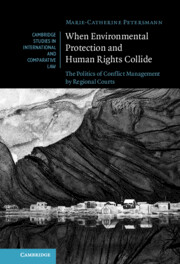 When Environmental Protection and Human Rights Collide
When Environmental Protection and Human Rights Collide Published online by Cambridge University Press: 20 October 2022
This second part delves into concrete cases of conflicts between environmental protection and human rights decided by regional human rights courts. Instead of focusing on the outcomes of each case, the analysis attends to the legal reasoning and justifications articulated by judges when decisions are reached, and courts come to a resolution of adversarial argumentations. How do regional human rights courts balance individual or collective human rights against the interest in environmental protection, when environmental protection and human rights collide? What emerges is a process where parties counter legal indeterminacy by granting weight to specific legal, political and normative goals in an idiom of universality – namely through justifications in the name of ‘universal interests’ or ‘universal truth claims’. Two strategies of ‘universal justification’ are induced from the cases. First, conflicts between environmental protection and human rights tend to be solved though a ‘universalisation strategy’ that rests on an invocation of the ‘general interest’. Second, a ‘universalisation strategy’ is visible when courts settle disputes by relying on the ‘objectivity’ and ‘authority’ provided by scientific or human rights experts. New argumentative dynamics are induced from a critical case-law analysis that reveals particular understandings of the human–environment relation, which engenders specific world-making effects.
To save this book to your Kindle, first ensure [email protected] is added to your Approved Personal Document E-mail List under your Personal Document Settings on the Manage Your Content and Devices page of your Amazon account. Then enter the ‘name’ part of your Kindle email address below. Find out more about saving to your Kindle.
Note you can select to save to either the @free.kindle.com or @kindle.com variations. ‘@free.kindle.com’ emails are free but can only be saved to your device when it is connected to wi-fi. ‘@kindle.com’ emails can be delivered even when you are not connected to wi-fi, but note that service fees apply.
Find out more about the Kindle Personal Document Service.
To save content items to your account, please confirm that you agree to abide by our usage policies. If this is the first time you use this feature, you will be asked to authorise Cambridge Core to connect with your account. Find out more about saving content to Dropbox.
To save content items to your account, please confirm that you agree to abide by our usage policies. If this is the first time you use this feature, you will be asked to authorise Cambridge Core to connect with your account. Find out more about saving content to Google Drive.